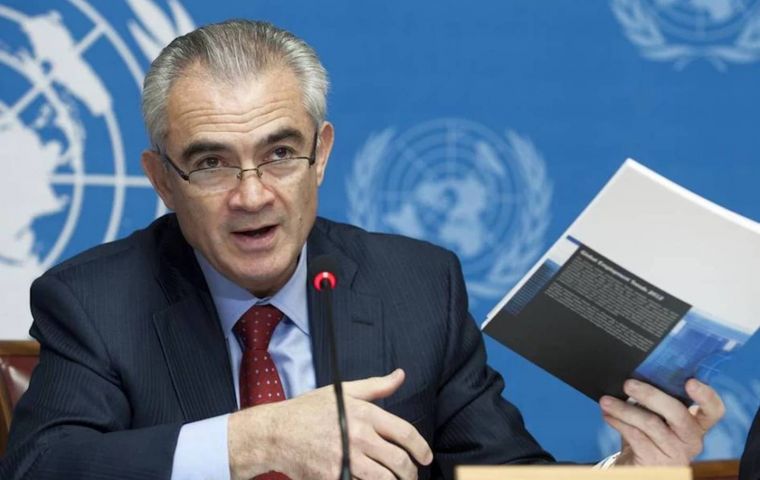MercoPress. South Atlantic News Agency
Latin America forecasted to expand 1,3% in 2023, after growing 3,7% last year, ECLAC report
 ECLAC Executive Secretary José Manuel Salazar-Xirinachs said monetary policy responses adopted worldwide in 2022, in a context of rising global inflation, have sparked greater financial volatility
ECLAC Executive Secretary José Manuel Salazar-Xirinachs said monetary policy responses adopted worldwide in 2022, in a context of rising global inflation, have sparked greater financial volatility In its annual report Preliminary Overview of the Economies of Latin America and the Caribbean, the UN Economic Commission for Latin America and the Caribbean, ECLAC projects that regional growth next year will be a third of the rate forecast for 2022.
In a context of external uncertainties and domestic restrictions, the countries of Latin America and the Caribbean will grow by 3.7% in 2022, just over half of the 6.7% rate recorded in 2021. It is estimated that the deceleration in economic growth will intensify in 2023, giving rise to a 1.3% rate.
According to the preliminary report, unveiled by the Executive Secretary of ECLAC, José Manuel Salazar-Xirinachs – the monetary policy responses adopted worldwide in 2022, in a context of rising global inflation, have sparked greater financial volatility and increased risk aversion, and have thereby prompted fewer capital flows to emerging economies, including the region’s economies. But the reduction in global inflation expected in 2023 will tend to moderate monetary policy rate hikes by the main central banks, the organization adds.
The document indicates that after the dynamism seen in the first half of 2022, the region’s economic activity has slowed, reflecting, on the one hand, an end to the rebound effect on the recovery from 2021, and on the other, the effects of restrictive monetary policies, greater limitations on fiscal spending, lower levels of consumption and investment, and the deterioration of the external context.
The report emphasizes that the labor market recovery process underway in the first half of 2022 did not allow for eliminating the traditional gaps between men and women exhibited in indicators such as the labor force participation rate and the unemployment rate. In addition, an increase in informality has been observed in 2022 along with a decline in real wages.
In the fiscal sphere, although there has been a reduction in the primary deficit, debt levels continue to be high, which means that fiscal space can be expected to continue conditioning the trajectory of public spending. The risk of interest rate hikes, of currency depreciations and greater sovereign risk are seen hampering the financing of government operations in 2023.
One aspect that the report highlights is that the changes seen in the trajectory of regional inflation in the second half of 2022, coupled with the deceleration in economic activity that is expected to continue next year, will reduce the pressure on monetary authorities in Latin America and the Caribbean to continue raising monetary policy rates.
ECLAC indicates that the current situation poses challenges for macroeconomic management. On fiscal matters, officials must avoid premature spending adjustments and expand fiscal space by reducing evasion and avoidance, reviewing tax expenditures, carrying out reforms to increase tax collection and the tax structure’s progressivity, and with multilateral support via the mobilization of global liquidity. It is also necessary to make progress on improving the efficiency and effectiveness of public spending to enhance fiscal policy.
In the monetary-financial realm, it is important to diversify the toolbox for facing the current scenario. Along with the monetary policy rate, officials should use macro-prudential and regulatory instruments that would help manage aggregate demand, minimizing the effects on growth and investment.
Finally, the report argues that it is critical to stimulate investment and productivity in order to address social demands, the creation of decent employment, to reduce informality, inequality and poverty, and move forward on climate change adaptation and mitigation. To that end, innovative public policies are needed on productive, financial, trade and social matters and on the care economy, to avoid another lost decade like the one observed for the 2014-2023 period.




Top Comments
Disclaimer & comment rulesCommenting for this story is now closed.
If you have a Facebook account, become a fan and comment on our Facebook Page!